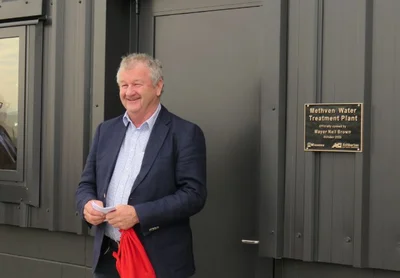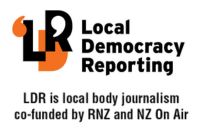Ashburton Mayor backs Three Waters replacement

Ashburton Mayor Neil Brown is welcoming the Government's replacement of the Three Waters reforms, which effectively returns power to local councils.
The Government announced on Monday it would repeal the Three Waters legislation - later renamed as 'Affordable Water' - by the end of next week.
It would be replaced by two pieces of legislation, under the Local Water Done Well reform.
Local Government Minister Simeon Brown said the repeal would restore local council ownership and control of water services, and responsibility for service delivery.
"We want to enable councils and communities to determine what works best for them while establishing clear expectations and bottom lines.”
Mayor Brown described it as a “totally different approach” than the previous Government.
“Now we are deciding what will happen in the future.
“We always knew there should be change, but we needed to be part of the conversation around the change which is now happening.
“It keeps it all local which is what we were wanting.”
Councils still need to meet the standards set by drinking water regulator Taumata Arowai.
A bill will be passed by February 23 to repeal the previous government's reforms and the replacement will then be implemented by the two replacement bills by mid-2025, Minister Brown said.
A technical advisory group will be appointed to provide expert advice on the implementation of the plans.
The first bill will be passed by mid-2024 and will set out provisions relating to council service delivery plans and transitional economic regulation.
It will also enable councils to "start shifting the delivery of water services into more financially sustainable configurations should they wish to do so".
The second bill - to be passed by mid-2025 - will set out long-term financial sustainability requirements and establish a range of structural and financing tools, including independent council-controlled organisations (CCO).
Councils can join forces to form a CCO under the new model, retaining ownership and control of their assets while gaining efficiencies of being a larger entity, Brown said.
“The detail on what it will look like is vague because it is up to [councils] to decide what the detail will look like.
“We will have those discussions to come up with the system that is best for us.”
Ashburton was among the councils that opposed Labour’s reform model as a member of the Communities 4 Local Democracy group of councils.
The group of councils believed they were losing community assets without compensation and removing local decision-making.
Three Waters planning
When National campaigned on repealing the affordable water reforms, the Ashburton District Council decided to to retain Three Waters work in its long-term plan budgets.
It means they won’t need the extra three months councils are being offered for settling on their plans as part of the repeal process.
Mayor Brown said Ashburton has been investing in its Three Waters infrastructure, but there was still more to be done.
“There is some serious money being spent on repair and replacement, and even enhancing our drinking water and wastewater to meet compliance.”
The most recent example was the $10m Methven Membrane treatment plant, with a similar $4.6m membrane treatment plant in Mount Somers on track to be operational later this year.
There is almost $11m slated for UV Treatment upgrade projects in 2024/25.
Over the 10-year plan there is $32m of drinking water network renewals district wide, $27.8m for wastewater renewals and upgrades in Ashburton, Methven and Rakaia.
By Jonathan Leask

